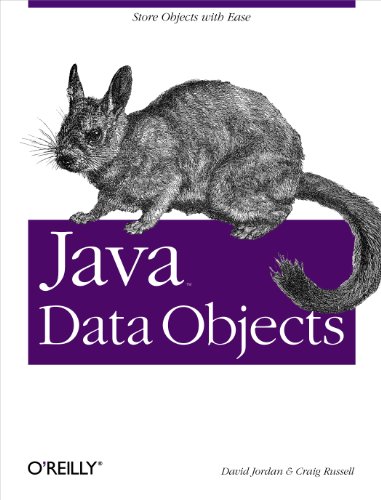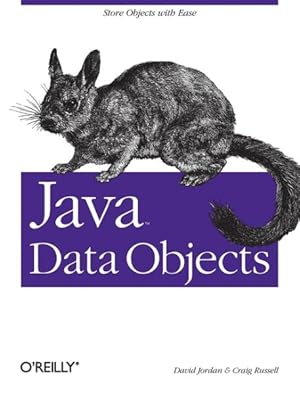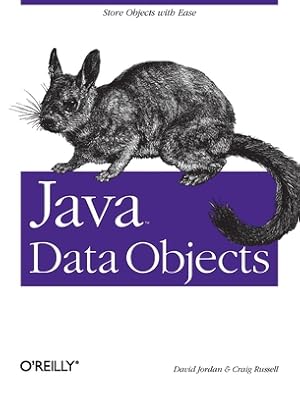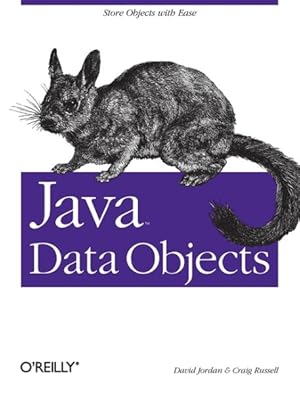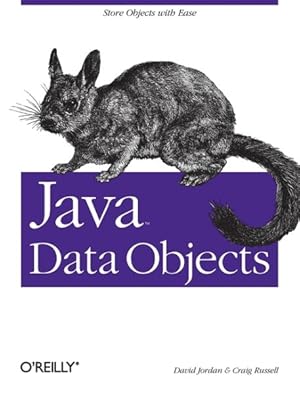Java Data Objects by David Jordan (23 results)
Search filters
Product Type
- All Product Types
- Books (23)
- Magazines & Periodicals (No further results match this refinement)
- Comics (No further results match this refinement)
- Sheet Music (No further results match this refinement)
- Art, Prints & Posters (No further results match this refinement)
- Photographs (No further results match this refinement)
- Maps (No further results match this refinement)
- Manuscripts & Paper Collectibles (No further results match this refinement)
Condition Learn more
- New (16)
- As New, Fine or Near Fine (3)
- Very Good or Good (4)
- Fair or Poor (No further results match this refinement)
- As Described (No further results match this refinement)
Binding
- All Bindings
- Hardcover (No further results match this refinement)
- Softcover (23)
Collectible Attributes
- First Edition (2)
- Signed (No further results match this refinement)
- Dust Jacket (No further results match this refinement)
- Seller-Supplied Images (11)
- Not Print on Demand (23)
Language (1)
Free Shipping
Seller Location
Seller Rating
-
Java Data Objects : Store Objects with Ease
Language: English
Published by O'Reilly Media, Incorporated, 2003
ISBN 10: 0596002769 ISBN 13: 9780596002763
Seller: Better World Books, Mishawaka, IN, U.S.A.
First Edition
Condition: Very Good. 1st Edition. Used book that is in excellent condition. May show signs of wear or have minor defects.
-
Paperback. Condition: Good. No Jacket. Pages can have notes/highlighting. Spine may show signs of wear. ~ ThriftBooks: Read More, Spend Less.
-
Java Data Objects: Store Objects with Ease
Seller: BooksByLisa, Highland Park, IL, U.S.A.
First Edition
Soft cover. Condition: New. First Edition. PHOTO AND VIDEO OF PAGES TAKEN TO SHOW CONDITION PRIOR TO SHIPPING; PHOTOS EMAILED FOR MORE SPECIFICS WHEN REQUESTED; Book. Book.
-
Condition: Muy bueno. : Java Data Objects es una guía completa para la API de JDO, que revoluciona la forma en que los desarrolladores de Java interactúan con las bases de datos. Este libro proporciona una introducción exhaustiva a JDO, comenzando con una aplicación simple que demuestra muchas de sus capacidades. Aprenderás a hacer que las clases sean persistentes, cómo JDO asigna clases persistentes a la base de datos y cómo configurar JDO en tiempo de ejecución. También se explica cómo realizar transacciones y consultas, cubriendo características opcionales como el acceso no transaccional y las transacciones optimistas. Se concluye discutiendo el uso de JDO en aplicaciones web y entornos J2EE. EAN: 9780596002763 Tipo: Libros Categoría: Tecnología Título: Java Data Objects Autor: David Jordan| Craig Russell Editorial: O'Reilly Media Idioma: en Páginas: 380 Formato: tapa blanda.
-
Paperback. Condition: Used; Very Good. ***Simply Brit*** Welcome to our online used book store, where affordability meets great quality. Dive into a world of captivating reads without breaking the bank. We take pride in offering a wide selection of used books, from classics to hidden gems, ensuring there is something for every literary palate. All orders are shipped within 24 hours and our lightning fast-delivery within 48 hours coupled with our prompt customer service ensures a smooth journey from ordering to delivery. Discover the joy of reading with us, your trusted source for affordable books that do not compromise on quality.
-
Condition: New.
-
Condition: New. Brand New! Not Overstocks or Low Quality Book Club Editions! Direct From the Publisher! We're not a giant, faceless warehouse organization! We're a small town bookstore that loves books and loves it's customers! Buy from Lakeside Books!
-
Condition: As New. Unread book in perfect condition.
-
Condition: New.
-
Paperback. Condition: New. "Java Data Objects" aims to revolutionize the way Java developers interact with databases and other datastores. It allows you to store and retrieve objects in a way that's natural toJava programmers. Instead of working with JDBC or EJB's container-managed persistence, you work directly with your Java objects. You don't have to copy data to and from database tables or issue SELECTs to perform queries: your JDO implementation takes care of persistence behind-the-scenes, and you make queries based on the fields of your Java objects, using normal Java syntax. The result is software that is truly object-oriented: not code that is partially object-oriented, with a large database-shaped lump on the back end. JDO lets you save plain, ordinary Java objects, and does not force you to use different data models and types for dealing with storage. As a result, your code becomes easier to maintain, easier to re-use, and easier to test. And you're not tied to a specific database vendor: your JDO code is entirely database-independent. You don't even need to know whether the datastore is a relational database, an object database, or just a set of files.The book offers a thorough introduction to JDO, starting with a simple application that demonstrates many of JDO's capabilities. It shows you how to make classes persistent, how JDO maps persistent classes to the database, how to configure JDO at runtime, how to perform transactions, and how to make queries. More advanced chapters cover optional features such as nontransactional access and optimistic transactions. The book concludes by discussing the use of JDO in web applications and J2EE environments.
-
Java Data Objects (Paperback or Softback)
Language: English
Published by O'Reilly Media 5/2/2003, 2003
ISBN 10: 0596002769 ISBN 13: 9780596002763
Seller: BargainBookStores, Grand Rapids, MI, U.S.A.
Paperback or Softback. Condition: New. Java Data Objects. Book.
-
Paperback. Condition: New. "Java Data Objects" aims to revolutionize the way Java developers interact with databases and other datastores. It allows you to store and retrieve objects in a way that's natural toJava programmers. Instead of working with JDBC or EJB's container-managed persistence, you work directly with your Java objects. You don't have to copy data to and from database tables or issue SELECTs to perform queries: your JDO implementation takes care of persistence behind-the-scenes, and you make queries based on the fields of your Java objects, using normal Java syntax. The result is software that is truly object-oriented: not code that is partially object-oriented, with a large database-shaped lump on the back end. JDO lets you save plain, ordinary Java objects, and does not force you to use different data models and types for dealing with storage. As a result, your code becomes easier to maintain, easier to re-use, and easier to test. And you're not tied to a specific database vendor: your JDO code is entirely database-independent. You don't even need to know whether the datastore is a relational database, an object database, or just a set of files.The book offers a thorough introduction to JDO, starting with a simple application that demonstrates many of JDO's capabilities. It shows you how to make classes persistent, how JDO maps persistent classes to the database, how to configure JDO at runtime, how to perform transactions, and how to make queries. More advanced chapters cover optional features such as nontransactional access and optimistic transactions. The book concludes by discussing the use of JDO in web applications and J2EE environments.
-
US$ 40.33
US$ 20.07 shipping
Ships from United Kingdom to U.S.A.Quantity: 2 available
Add to basketCondition: New.
-
US$ 41.07
US$ 20.07 shipping
Ships from United Kingdom to U.S.A.Quantity: 2 available
Add to basketCondition: As New. Unread book in perfect condition.
-
Java Data Objects
Language: English
Published by O'Reilly Media 2003-05-02, 2003
ISBN 10: 0596002769 ISBN 13: 9780596002763
Seller: Chiron Media, Wallingford, United Kingdom
US$ 41.62
US$ 20.72 shipping
Ships from United Kingdom to U.S.A.Quantity: 2 available
Add to basketPaperback. Condition: New.
-
Java Data Objects
Language: English
Published by O'Reilly Media, Inc, USA, 2003
ISBN 10: 0596002769 ISBN 13: 9780596002763
Seller: THE SAINT BOOKSTORE, Southport, United Kingdom
US$ 40.35
US$ 22.94 shipping
Ships from United Kingdom to U.S.A.Quantity: 2 available
Add to basketPaperback / softback. Condition: New. New copy - Usually dispatched within 4 working days. 640.
-
Java Data Objects
Language: English
Published by Oreilly & Associates Inc, 2003
ISBN 10: 0596002769 ISBN 13: 9780596002763
Seller: Revaluation Books, Exeter, United Kingdom
US$ 49.65
US$ 16.72 shipping
Ships from United Kingdom to U.S.A.Quantity: 2 available
Add to basketPaperback. Condition: Brand New. 1st edition. 356 pages. 9.25x7.25x1.00 inches. In Stock.
-
paperback. Condition: New. In shrink wrap. Looks like an interesting title!
-
Paperback. Condition: New. "Java Data Objects" aims to revolutionize the way Java developers interact with databases and other datastores. It allows you to store and retrieve objects in a way that's natural toJava programmers. Instead of working with JDBC or EJB's container-managed persistence, you work directly with your Java objects. You don't have to copy data to and from database tables or issue SELECTs to perform queries: your JDO implementation takes care of persistence behind-the-scenes, and you make queries based on the fields of your Java objects, using normal Java syntax. The result is software that is truly object-oriented: not code that is partially object-oriented, with a large database-shaped lump on the back end. JDO lets you save plain, ordinary Java objects, and does not force you to use different data models and types for dealing with storage. As a result, your code becomes easier to maintain, easier to re-use, and easier to test. And you're not tied to a specific database vendor: your JDO code is entirely database-independent. You don't even need to know whether the datastore is a relational database, an object database, or just a set of files.The book offers a thorough introduction to JDO, starting with a simple application that demonstrates many of JDO's capabilities. It shows you how to make classes persistent, how JDO maps persistent classes to the database, how to configure JDO at runtime, how to perform transactions, and how to make queries. More advanced chapters cover optional features such as nontransactional access and optimistic transactions. The book concludes by discussing the use of JDO in web applications and J2EE environments.
-
Condition: New. This work offers a thorough introduction to Java Data Objects, starting with a simple application that demonstrates many of JDO s capabilities. It shows you how to make classes persistent, how JDO maps persistent classes to the database and how to configure.
-
Java Data Objects
Language: English
Published by O'reilly Media Mai 2003, 2003
ISBN 10: 0596002769 ISBN 13: 9780596002763
Seller: AHA-BUCH GmbH, Einbeck, Germany
Taschenbuch. Condition: Neu. Neuware - Java Data Objects revolutionizes the way Java developers interact with databases and other datastores. JDO allows you to store and retrieve objects in a way that's natural to Java programmers. Instead of working with JDBC or EJB's container-managed persistence, you work directly with your Java objects. You don't have to copy data to and from database tables or issue SELECTs to perform queries: your JDO implementation takes care of persistence behind-the-scenes, and you make queries based on the fields of your Java objects, using normal Java syntax.The result is software that is truly object-oriented: not code that is partially object-oriented, with a large database-shaped lump on the back end. JDO lets you save plain, ordinary Java objects, and does not force you to use different data models and types for dealing with storage. As a result, your code becomes easier to maintain, easier to re-use, and easier to test. And you're not tied to a specific database vendor: your JDO code is entirely database-independent. You don't even need to know whether the datastore is a relational database, an object database, or just a set of files.This book, written by the JDO Specification Lead and one of the key contributors to the JDO Specification, is the definitive work on the JDO API. It gives you a thorough introduction to JDO, starting with a simple application that demonstrates many of JDO's capabilities. It shows you how to make classes persistent, how JDO maps persistent classes to the database, how to configure JDO at runtime, how to perform transactions, and how to make queries. More advanced chapters cover optional features such as nontransactional access and optimistic transactions. The book concludes by discussing the use of JDO in web applications and J2EE environments.Whether you only want to read up on an interesting new technology, or are seriously considering an alternative to JDBC or EJB CMP, you'll find that this book is essential. It provides by far the most authoritative and complete coverage available.
-
Condition: good. Befriedigend/Good: Durchschnittlich erhaltenes Buch bzw. Schutzumschlag mit Gebrauchsspuren, aber vollständigen Seiten. / Describes the average WORN book or dust jacket that has all the pages present.
-
US$ 49.51
US$ 86.96 shipping
Ships from United Kingdom to U.S.A.Quantity: 1 available
Add to basketPaperback. Condition: New. "Java Data Objects" aims to revolutionize the way Java developers interact with databases and other datastores. It allows you to store and retrieve objects in a way that's natural toJava programmers. Instead of working with JDBC or EJB's container-managed persistence, you work directly with your Java objects. You don't have to copy data to and from database tables or issue SELECTs to perform queries: your JDO implementation takes care of persistence behind-the-scenes, and you make queries based on the fields of your Java objects, using normal Java syntax. The result is software that is truly object-oriented: not code that is partially object-oriented, with a large database-shaped lump on the back end. JDO lets you save plain, ordinary Java objects, and does not force you to use different data models and types for dealing with storage. As a result, your code becomes easier to maintain, easier to re-use, and easier to test. And you're not tied to a specific database vendor: your JDO code is entirely database-independent. You don't even need to know whether the datastore is a relational database, an object database, or just a set of files.The book offers a thorough introduction to JDO, starting with a simple application that demonstrates many of JDO's capabilities. It shows you how to make classes persistent, how JDO maps persistent classes to the database, how to configure JDO at runtime, how to perform transactions, and how to make queries. More advanced chapters cover optional features such as nontransactional access and optimistic transactions. The book concludes by discussing the use of JDO in web applications and J2EE environments.


